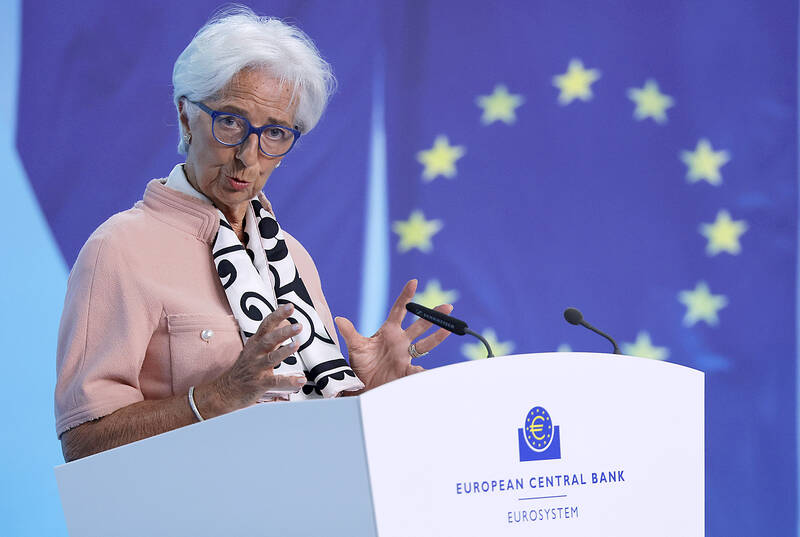The European Central Bank (ECB) cut interest rates yesterday for the seventh time to counter worries about economic growth fueled by US President Donald Trump’s tariff onslaught.
The bank’s move should support economic activity in the 20 countries that use the euro currency by making credit more affordable for consumers and businesses.
ECB President Christine Lagarde said at a post-decision news conference that “the major escalation in global trade tensions and the associated uncertainty will likely lower euro area growth by dampening exports.”

Photo: Ronald Wittek, EPA-EFE
“And it may drag down investment and consumption,” she said.
The bank’s rate-setting council decided at a meeting in Frankfurt to lower its benchmark rate by a quarter percentage point to 2.25 percent. The bank has been steadily cutting rates after raising them sharply to combat an outbreak of inflation from 2022 to 2023.
Now that inflation has fallen, growth worries have taken center stage. The economy in the 20 countries that use the euro grew a modest 0.2 percent in the final three months of last year. Inflation was 2.2 percent last month, close to the bank’s target of 2 percent.
The cut was widely expected by analysts given the sudden shadow cast over the eurozone’s growth outlook by Trump’s April 2 announcement of unexpectedly high tariffs on goods from other countries starting at 10 percent and ranging as high as 49 percent. The European Union faces a 20 percent tariff.
At the bank’s last meeting on March 6, Lagarde had raised the possibility of an upcoming “pause” in the bank’s series of rate cuts. But that option was practically eliminated by Trump’s announcement.
Trump has suspended the tariffs for 90 days, but the possibility of the 20 percent tariff rate he has proposed for Europe left economists and policymakers concerned that the higher costs will weigh on business activity and lead to slower growth or even a recession if he carries through.
Earlier yesterday, the Bank of Korea (BOK) held its interest rate steady at 2.75 percent, its third straight decision to keep rates unchanged after a 0.25 percentage point cut in February.
Given the “significant uncertainty” due to US tariffs and the government’s push for economic stimulus, “the board judged it appropriate to keep the base rate unchanged for now while closely assessing changes in domestic and external conditions,” the bank said.
BOK Governor Rhee Chang-yong said the decision was driven by tariff-related “uncertainty” going forward, which has grown to an “unprecedented level.”
“The intensity of US tariff policies and the swift shifts in responses from major economies are evolving so rapidly that it is currently difficult to even establish a baseline scenario for forecasts,” he said at a press conference in Seoul.
Rhee hinted that the board is considering additional cuts next month, but is “closely reviewing both domestic and external economic conditions.”
The country’s annual economic growth is expected to fall short of a recent forecast due to sweeping US tariffs and the fallout from the ex-president’s martial law declaration, he said.
“This year’s annual growth rate is now expected to fall short of the 1.5 percent forecast made in February,” Rhee said.
Additional reporting by AFP










